Building Signal Booster Systems
Improving Cellular Signal Inside A Building
Do you have a poor cellular signal inside your home, office, warehouse or other building?
- Tired of Going Outside to Make a Cell Phone Call?
- Need to Be in Touch 24/7
- Dropped and Missed Calls Losing You Customers?
- Tired of Not Getting The 4G Internet Speeds Promised?
- Want an EASY Way to Fix These Problems?
Select Systems By Area Size
| Small Areas Up To 1,500 Sq Ft, 1-2 Room, Work Area, Around a Desk, etc. Learn More |
Medium Sized Areas Up To 2,500 Sq Ft Small To Mid Sized Homes, Mobile Homes, Small Offices Learn More |
Larger Buildings Over 2,500 Sq Ft Large Homes, Multi-Story Buildings, Warehouses, Etc. Learn More |
-
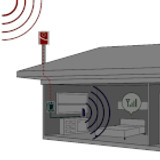 Home Signal Boosters
Home Signal Boosters
-
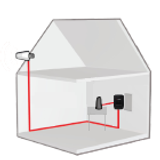 Small Area Signal Boosters
Small Area Signal Boosters
-
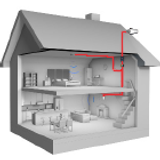 Mid-Sized Area Signal Boosters
Mid-Sized Area Signal Boosters
-
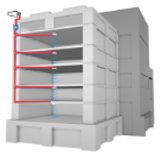 Business Signal Booster Systems
Business Signal Booster Systems
- Installed Signal Booster Systems
-


weBoost Home MultiRoom Building Signal Booster System 470144
weBoost
$569.99Target Your Home's Weak Signal Areas weBoost Home Multi-Room Signal Booster System With its considerable power, the Home Multi-Room delivers reliable cellular connectivity throughout a coverage area of three large rooms; up to 5,000 square feet. The...- SKU:
- AP470144
- Availability:
- In Stock- Usually Ships In 1-2 Days
- Short Description:
- Cellular Signal Booster System for Small - Midsized Homes, Work Trailers, Portable Buildings, Mobile Homes.
$569.99 -


weBoost Installed Home Complete Building Signal Booster System
weBoost
$1,499.99The FIRST "Installation Included" Home Cell Signal Booster weBoost Installed Home Complete Signal Booster System will be installed in your home by a professional. You no longer have to deal with installing a signal booter in your home yourself or search...- SKU:
- AP474445
- Availability:
- OUT OF STOCK
- Who Is Most Likely to Use This Product:
- Any home owner that wants a professionally installed cellular signal booster system. Includes households with a weak indoor cell signal where several cellular devices are used. Great for houses made of signal-blocking materials.
$1,499.99 -

![weBoost Destination RV Cellular Signal Booster System [470159] weBoost Destination RV Cellular Signal Booster System [470159]](https://cdn11.bigcommerce.com/s-d4wbycd/images/stencil/350x350/products/2934/10630/weboost-destination-rv-470159-signal-booster__42582.1630340379.jpg?c=2)
weBoost Destination RV Cellular Signal Booster System [470159]
weBoost
$649.99weBoost Destination RV Cellular Signal Booster System Bring The Most Powerful Cellular Signal to Any Campsite! The weBoost Destination RV is our most powerful cell signal booster designed for large RVs, toy haulers, and trailers. The weBoost...- SKU:
- AP470159
- Availability:
- In Stock - We Usually Ship This Item In 1-2 Days
$649.99 -
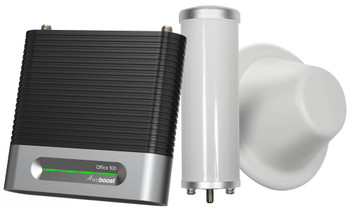

weBoost Office 100 | Building Cell Signal Booster System 50 Ohm 472060
weBoost
$1,299.99weBoost Office 100 Get better cell coverage at work. weBoost Office 100 Signal Booster System is ideal for small businesses looking for a complete amplifier solution to improve cellular signal. It will improve the signal to cell phones, hotspots,...- SKU:
- AP472060
- Availability:
- In Stock - We Usually Ship This Item Within 1-2 Days
$1,299.99 -


weBoost Office 100 Building Signal Booster System w/2 Indoor Antennas
AlternativeWireless.com
ONLY: $1,579.95$1,450.00weBoost Office 100 Kit - Includes Two Indoor Antennas Expanded Cellular Signal Coverage Area in Your Small Business. weBoost Office 100 Signal Booster System is ideal for small businesses looking for a complete amplifier solution to improve...- SKU:
- AP472060-2DA
- Availability:
- In Stock - We Usually Ship This Item Within 1-2 Days
ONLY: $1,579.95$1,450.00 -

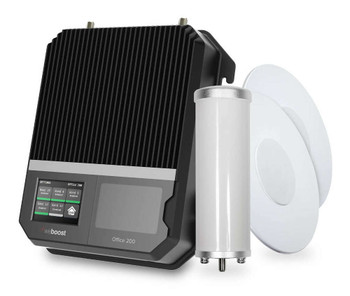
weBoost Office 200 Building Cell Signal Booster w/2 Indoor Antennas
weBoost
ONLY: $1,959.99$1,850.00weBoost Office 200 Signal Booster System - With 2 Indoor Ceiling Mount Antennas weBoost's most powerful DIY cell signal improvement solution for businesses (and large homes) The new weBoost Office 200 Building Signal Booster System comes as a...- SKU:
- AP472047-2DA
- Availability:
- In Stock - We Usually Ship This Item Within 1-2 Days
ONLY: $1,959.99$1,850.00 -

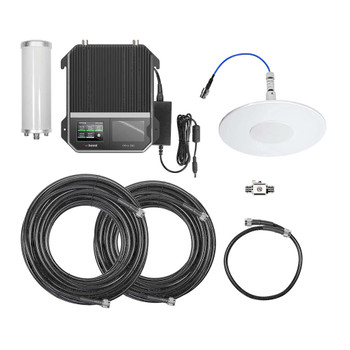
weBoost Office 200 Omni Building Cell Signal Booster 50 Ohm System [472047]
weBoost
$1,699.99weBoost Office 200 Small Business Cell Signal Booster System weBoost's most powerful DIY cell signal improvement solution for small business owners. The weBoost Office 200 System comes as a complete cellular signal improving kit for your...- SKU:
- AP472047
- Availability:
- In Stock - We Usually Ship This Item Within 1-2 Days
- Short Description:
- The weBoost Office 200 - For small-to-medium business owners looking for a powerful, DIY solution to immediately improve cell signal.
$1,699.99 -

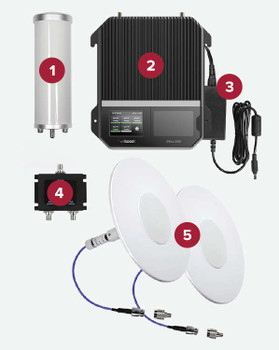
weBoost INSTALLED | Office 200 Business Building Signal Booster System
weBoost
$3,799.99weBoost Installed | Office 200 Building Signal Booster System Let Professionals Install Better Cell Coverage Where You Work A cellular signal booster system that comes with installation - Resolve poor indoor cell signal issues with a quick, turnkey...- SKU:
- AP473047
- Availability:
- Out Of Stock
- Short Description:
- The weBoost INSTALLED | Office 200 comes with everything you need to get a better cell signal in your small to medium business - Including Professional Installation.
$3,799.99 -


weBoost Home Studio Cellular Signal Booster System [470166]
weBoost
$349.99How To Get a Better Cell Signal Inside Your Home with the weBoost Home Studio The weBoost Home Studio Cellular Signal Booster System is an excellent value for instantly improving talk, text, and cellular Internet in a small area inside your home. It can...- SKU:
- AP470166
- Availability:
- OUT OF STOCK
- USE THIS SYSTEM FOR::
- Improving Your Cell Phone Signal Inside A Small Area Like A Room, Study, Workshop, Garage, Trailer, Mobile Home.
$349.99 -
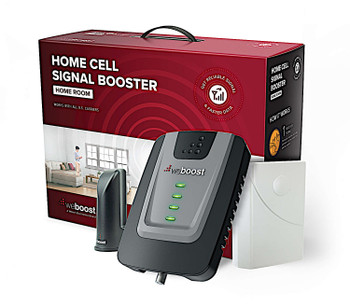

weBoost Home Room Cellular Signal Booster System [472120]
weBoost
$399.99Enjoy better cellcoverage at home. With the Home Room, there’s a more affordable way to stop dropped calls, missed texts, slow data speeds, and other connectivity issues at home. The Home Room by weBoost is our standard, multi-user cell signal...- SKU:
- AP472120
- Availability:
- OUT OF STOCK
- Use This System For:
- Improving Your Cell Phone Signal Inside A Small Area Like A Room, Study, Workshop, Garage, Trailer, Mobile Home.
$399.99 -


weBoost Home MultiRoom Building Signal Booster +Surge Prot & Antenna Mount
weBoost
ONLY: $669.97$599.99weBoost Home MultiRoom Signal Booster System This Kit Includes Lightning Surge Protector & Outdoor Antenna Mounting Pole The weBoost HOME MULTIROOM Booster System is part of weBoost's Home Cell Signal Booster Systems. From its sleek,...- SKU:
- AP470144-SGMTCK
- Availability:
- Out Of Stock
- Why You Need This:
- Get A Better Cellular Signal Inside A Small - Midsized Home, Work Trailer, Portable Building, Mobile Home.
ONLY: $669.97$599.99
